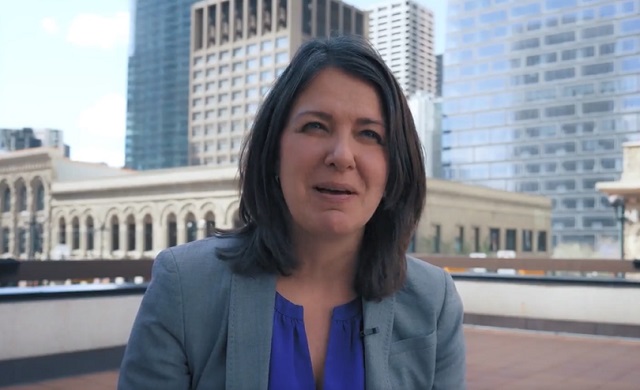Alberta
Danielle Smith slams Trudeau’s methane emissions rules as ‘unrealistic,’ ‘unconstitutional’

From LifeSiteNews
‘Instead of building on Alberta’s award-winning approach, Ottawa wants to replace it with costly, dangerous and unconstitutional new federal regulations that won’t benefit anyone beyond Environment and Climate Change Minister Steven Guilbeault’s post-office career,’ a joint statement read
Alberta Premier Danielle Smith condemned the Trudeau government’s methane emissions cap as “unrealistic” and “unconstitutional.”
On December 4, Smith and Minister of Environment and Protected Areas Rebecca Schulz issued a joint statement blasting Environment Minister Steven Guilbeault’s new draft methane regulations.
“The federal government has unilaterally established new methane emissions rules and targets to help win international headlines,” the joint statement read.
“Instead of building on Alberta’s award-winning approach, Ottawa wants to replace it with costly, dangerous and unconstitutional new federal regulations that won’t benefit anyone beyond Environment and Climate Change Minister Steven Guilbeault’s post-office career,” it continued.
The proposed regulations, drafted December 4 after the 2023 United Nations Climate Change Conference (COP28) in Dubai, restrict oil and gas methane emissions to allegedly reduce “climate change.”
“The proposed methane regulations are consistent with Canada’s commitment to cap and cut oil and gas emissions and with calls from the International Energy Agency for all oil- and gas-producing countries to reduce methane emissions from the sector by 75 percent by 2030,” the news release read.
Under the proposed plan, methane regulations must reduce by 217 megatonnes (carbon dioxide equivalent) from 2027 to 2040.
“Canada is on track to meet its 2025 methane reduction target of 40 to 45 percent below 2012 levels,” the statement asserted. “The draft regulations published today are amendments to the 2018 methane regulations.”
In response to the regulations, Smith pointed out that Alberta has the autonomy to determine its own climate regulations without the direction of the Liberal government under the leadership of Prime Minister Justin Trudeau.
“Managing emissions from Alberta’s oil and gas industry is our constitutional right and responsibility, not Ottawa’s, and we are getting the job done,” Smith declared. “Using a province-led approach, Alberta has already reduced methane emissions from the oil and gas sector by 45 percent – hitting our target three years early – and we’re just getting started.”
“Meanwhile, not only is it illegal for Ottawa to attempt to regulate our industries in this manner, Ottawa also hasn’t even hit one of its past arbitrary and unscientific emissions targets,” she revealed.
“Once again, the federal government is setting unrealistic targets and timelines,” Smith added. “Infrastructure can only be updated as quickly as technology allows. For example, Alberta will not accept nor impose a total ban on flaring at this time, as it is a critical health and safety practice during production.”
“Given the unconstitutional nature of this latest federal intrusion into our provincial jurisdiction, our government will use every tool at our disposal to ensure these absurd federal regulations are never implemented in our province,” Smith concluded.
This is hardly the first time Smith has defended Alberta from Trudeau’s climate regulations. Smith has repeatedly asserted Alberta’s right to control power grid, promising the province will not be “transitioning away” from oil and natural gas.
Smith has warned that Canadians could freeze in the winter if the new “clean emissions” regulations are enforced, an assertion supported by Alberta’s electric grid operator, Alberta Electric System Operator (AESO), which warned that Trudeau’s 2035 net-zero power grid goal will mean instability for the western province and are “not feasible.”
Two recent court rulings dealt a serious blow to the Trudeau government’s environmental activism via legislation. The most recent was in November when the Federal Court of Canada ruled in favor of Alberta and Saskatchewan and overturned the Trudeau government’s ban on single-use plastic, calling it “unreasonable and unconstitutional.”
The second victory for Alberta and Saskatchewan concerns a Supreme Court ruling that stated that Trudeau’s law, C-69, dubbed the “no-more pipelines” bill, is “mostly unconstitutional.” The decision returned authority over the pipelines to provincial governments, meaning oil and gas projects headed up by the provinces should be allowed to proceed without federal intrusion.
In May, Guilbeault declared that violating environmental regulations banning the use of coal and gas-fired power after 2035 may even result in criminal sanctions, a statement that only increased the tension between the federal government and the provinces opposed to the proposed policies.
Alberta
Big win for Alberta and Canada: Statement from Premier Smith

Premier Danielle Smith issued the following statement on the April 2, 2025 U.S. tariff announcement:
“Today was an important win for Canada and Alberta, as it appears the United States has decided to uphold the majority of the free trade agreement (CUSMA) between our two nations. It also appears this will continue to be the case until after the Canadian federal election has concluded and the newly elected Canadian government is able to renegotiate CUSMA with the U.S. administration.
“This is precisely what I have been advocating for from the U.S. administration for months.
“It means that the majority of goods sold into the United States from Canada will have no tariffs applied to them, including zero per cent tariffs on energy, minerals, agricultural products, uranium, seafood, potash and host of other Canadian goods.
“There is still work to be done, of course. Unfortunately, tariffs previously announced by the United States on Canadian automobiles, steel and aluminum have not been removed. The efforts of premiers and the federal government should therefore shift towards removing or significantly reducing these remaining tariffs as we go forward and ensuring affected workers across Canada are generously supported until the situation is resolved.
“I again call on all involved in our national advocacy efforts to focus on diplomacy and persuasion while avoiding unnecessary escalation. Clearly, this strategy has been the most effective to this point.
“As it appears the worst of this tariff dispute is behind us (though there is still work to be done), it is my sincere hope that we, as Canadians, can abandon the disastrous policies that have made Canada vulnerable to and overly dependent on the United States, fast-track national resource corridors, get out of the way of provincial resource development and turn our country into an independent economic juggernaut and energy superpower.”
Alberta
Energy sector will fuel Alberta economy and Canada’s exports for many years to come

From the Fraser Institute
By any measure, Alberta is an energy powerhouse—within Canada, but also on a global scale. In 2023, it produced 85 per cent of Canada’s oil and three-fifths of the country’s natural gas. Most of Canada’s oil reserves are in Alberta, along with a majority of natural gas reserves. Alberta is the beating heart of the Canadian energy economy. And energy, in turn, accounts for one-quarter of Canada’s international exports.
Consider some key facts about the province’s energy landscape, as noted in the Alberta Energy Regulator’s (AER) 2023 annual report. Oil and natural gas production continued to rise (on a volume basis) in 2023, on the heels of steady increases over the preceding half decade. However, the dollar value of Alberta’s oil and gas production fell in 2023, as the surging prices recorded in 2022 following Russia’s invasion of Ukraine retreated. Capital spending in the province’s energy sector reached $30 billion in 2023, making it the leading driver of private-sector investment. And completion of the Trans Mountain pipeline expansion project has opened new offshore export avenues for Canada’s oil industry and should boost Alberta’s energy production and exports going forward.
In a world striving to address climate change, Alberta’s hydrocarbon-heavy energy sector faces challenges. At some point, the world may start to consume less oil and, later, less natural gas (in absolute terms). But such “peak” consumption hasn’t arrived yet, nor does it appear imminent. While the demand for certain refined petroleum products is trending down in some advanced economies, particularly in Europe, we should take a broader global perspective when assessing energy demand and supply trends.
Looking at the worldwide picture, Goldman Sachs’ 2024 global energy forecast predicts that “oil usage will increase through 2034” thanks to strong demand in emerging markets and growing production of petrochemicals that depend on oil as the principal feedstock. Global demand for natural gas (including LNG) will also continue to increase, particularly since natural gas is the least carbon-intensive fossil fuel and more of it is being traded in the form of liquefied natural gas (LNG).
Against this backdrop, there are reasons to be optimistic about the prospects for Alberta’s energy sector, particularly if the federal government dials back some of the economically destructive energy and climate policies adopted by the last government. According to the AER’s “base case” forecast, overall energy output will expand over the next 10 years. Oilsands output is projected to grow modestly; natural gas production will also rise, in part due to greater demand for Alberta’s upstream gas from LNG operators in British Columbia.
The AER’s forecast also points to a positive trajectory for capital spending across the province’s energy sector. The agency sees annual investment rising from almost $30 billion to $40 billion by 2033. Most of this takes place in the oil and gas industry, but “emerging” energy resources and projects aimed at climate mitigation are expected to represent a bigger slice of energy-related capital spending going forward.
Like many other oil and gas producing jurisdictions, Alberta must navigate the bumpy journey to a lower-carbon future. But the world is set to remain dependent on fossil fuels for decades to come. This suggests the energy sector will continue to underpin not only the Alberta economy but also Canada’s export portfolio for the foreseeable future.
-

 Business2 days ago
Business2 days agoCalifornia planning to double film tax credits amid industry decline
-

 2025 Federal Election5 hours ago
2025 Federal Election5 hours agoCanada Continues to Miss LNG Opportunities: Why the World Needs Our LNG – and We’re Not Ready
-

 Catherine Herridge2 days ago
Catherine Herridge2 days agoFBI imposed Hunter Biden laptop ‘gag order’ after employee accidentally confirmed authenticity: report
-

 Business1 day ago
Business1 day agoB.C. Credit Downgrade Signals Deepening Fiscal Trouble
-

 COVID-191 day ago
COVID-191 day agoTrump’s new NIH head fires top Fauci allies and COVID shot promoters, including Fauci’s wife
-

 2025 Federal Election1 day ago
2025 Federal Election1 day agoWill Four More Years Of Liberals Prove The West’s Tipping Point?
-

 Freedom Convoy1 day ago
Freedom Convoy1 day agoFreedom Convoy leaders Tamara Lich, Chris Barber found guilty of mischief
-

 Business1 day ago
Business1 day agoTrump’s ‘Liberation Day’ – Good News for Canadian Energy and Great News for WCSB Natural Gas







